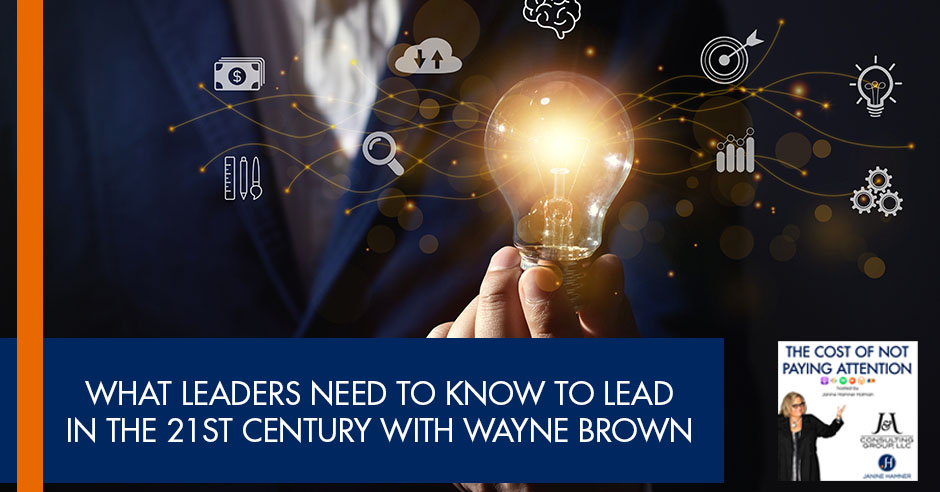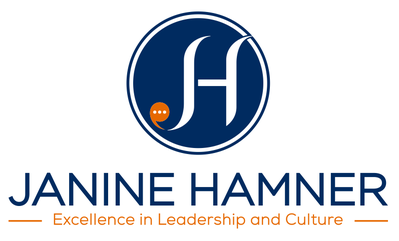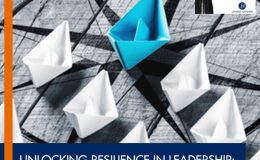
Change is bound to happen, and leaders must adapt to the 21st century. Last-generation leaders can’t navigate the online space and social media as effectively as the next generation. Up-and-coming leaders need to be ready because the shape of the future is in their hands.
Join Janine Hamner Holman as she talks to Author, Speaker, and Executive Coach of the Year 2022, Wayne Brown. Learn what it takes to be a leader in the 21st century. Find out how to reshape toxic cultures and turn them into progressive and transformative ones. Moreover, discover why those at the helm of a team need to be adaptable and vulnerable at the same time. Start leading now and embrace positive change.
GUEST: Wayne Brown | LinkedIn | Visit their Website: https://coaching4companies.com
HOST: Janine Hamner Holman | Janine@JandJCG.com | LinkedIn, Facebook, Instagram, and Twitter
—
Listen to the podcast here
What Leaders Need to Know to Lead in the 21st Century with Wayne Brown
What am I paying attention to now? Many things turn out in a particular way because we decide that is how it is going to go. For instance, I was talking with a client who is the CEO of a company. He was telling me about a series of upcoming meetings that he wanted me to help with including helping him facilitate them because they were going to be difficult meetings. I asked him, “What about these meetings feels to you like it is going to be hard?” As we pulled it apart, there wasn’t anything that was so hard. The meetings were going to take a lot of work. And certainly, people might not agree. It got me thinking about how often we think things are going to be hard, and they turn out to be hard, in part because we make them hard.
Recently, I was also doing a conflict management webinar with an organization. One of the things that kept coming up was how many self-limiting beliefs we have (beliefs that limit us).
The reality is that if my husband and I are going to have a conversation, there may well be some conflict. We have conflicts all the time in life. It is about, “I think one thing, and you think another thing.” The question is, “How can we have healthy conflict? How can we have a conflict that moves the ball down the court? How can we have a conversation?” It doesn’t even have to be conflict-y but how can we have a conversation in which your perspective and my perspective get revealed, and we get to come to a resolution that is someplace in the middle?
You will see that this is something that today’s guest knows a lot about as our conversation evolves. I’m excited to introduce you to Wayne Brown. He has been called a nomad and an adventurer, which is true. He calls himself a knowledge broker. He is passionate about traveling the world and about meeting people in places that aren’t always in the top ten places to visit. For instance, we are talking with him in Shanghai. Shanghai might be on my top ten list of places to visit.
At the age of 23, Wayne built his first home. It was the same year that he started his first business. My hunch is that it was in Australia but we will find out a little bit more about that. Fast forward to next year, 2023, when his second book is scheduled for release in February. He has been nominated as Executive Coach of the year by CEO Today Magazine. Congratulations, and welcome to the show.
Thank you, Janine. It is great to be here. I’m looking forward to our conversation. You touched on many points in your introduction that we could talk about for hours.
Let’s get started the way that I often start with guests. Wayne, tell me something that you have noticed that people are not paying attention to, either consciously or unconsciously, and what the cost is of that inattention.
There are many topics.
There is a big long list. Pick one that you would like to talk about.
I would keep it somewhat topical inside leadership and the shift for leaders to be able to transition into the 21st century. The method of how they go about that is becoming more challenging. There are companies that are proactive. Kudos to them but the majority of companies are lagging behind in this transition. The consequences of that is we will have major challenges in the coming 5 to 10 years because change is not going to slow down. It is exponential. It is going to continue that way and maybe even get faster. I see this as an area where organizations and leaders need to pay more attention.
Change will never slow down. It is exponential and will only continue to get faster. Share on XLeadership is one of my favorite topics, this idea of 21st-century leadership and what is called for now. Wayne, you and I are more or less the same age. When we were coming up in the world of work, leadership was different than what it is now. When I was a young pup starting in the world, the way that I was taught to work was to keep my head down, shut up, don’t rock the boat, and be happy you get a paycheck. If your boss says something mean to you, try to slough it off.
That command and control style of leadership, often micromanaging style of leadership and sometimes toxic leadership, is not being supported in many workplaces. Unfortunately, in some, it is alive and well but in many workplaces that are beginning to understand what is needed as we move more into this 21st century, there is a different style of leadership. I want to probe with you both. What do we say to those leaders that are still stuck in the 20th century style leadership, where their organization is often a large enterprise organizations? They feel like, “We don’t have to care. What do you say to them?”
I would hope that people would say, “Bye-bye,” but the reality is that I don’t think organizations are naive to the fact that they have leaders that are acting in that way. I had a guest on my own podcast. We were talking about the dark triad. You mentioned toxic leadership. The situation that we see a lot of now is that there are still many toxic leaders. As much as the educated leaders amongst us know that they need to change, that is not always what happens. The reality is that over their career, there is a good chance they have been successful. They tend to rise to the top because of that.

21st Century: There are many toxic leaders. You would think that they would change. But in reality, they rose to the top because of their attitude.
If you treat people like crap, you are going to have a big impact on those people but you are also going to get work out of them. You are going to burn through them quickly. They are going to be a shell of their former selves when they leave you. If you don’t care about humans and you are willing to churn and burn through humanity, you can get a lot of work product out of people by being crappy to them.
You become successful.
It is, unfortunately, true.
Organizations are stuck with that dilemma. If they say goodbye to those leaders, then they do leave a hole unless they have the right planning in place. It is not a simple set-and-forget approach. It takes a lot of work to reculture the organization. What happens is that the people under those toxic leaders are also forming and shaping their personalities and characteristics to accommodate those leaders. Some of the people, the younger generations, bless them, taking matters into their own hands and are not tolerating it. You and I came through the Baby Boom generation, we tolerated it, and there is still a lot of us in the industry who are tolerating these toxic triad leaders, unfortunately.
All of us humans fall into myopia. That is how it is here in the US and in Asia. You have been doing work extensively in Asia for several years and in Europe before that, and still ping-ponging back and forth. You have a much more global perspective about the willingness of young people to say, “My life is short. My life is important. It is the only one I got as far as I know. I’m not willing to put up with this treatment at work.” We in the US tend to think of that as a US phenomenon.
This is not a US specific experience. There are a lot of shifts within the demographics worldwide. Gen Z and even the younger generation that is coming through, surprisingly and scary as that sound, there is a younger generation not far away from hitting the workforce younger than Gen Z.
They are even less tolerant of poor behavior in the workplace. If we thought it was bad with Gen Z, buckle your seat belts, friends.
My area of focus is on executive talents. It is leaders by another name but people who are nominated in corporations as potential high-performance employees who are going to progress to the next level. The challenge I see for them in particular, I’m generalizing but in the majority of organizations, is that their role model is that twentieth century leader who hasn’t been able to transition themselves properly.
As these new leaders come forward, they are going to adopt the wrong methodology, style, and mannerisms, and they will struggle. We, as humans, are adaptable. Hopefully, as time passes, there will be a gravitational shift across humanity toward this new world. That is going to take time. The problem that we have is that we are against the clock.
In history, we haven’t experienced this before. There have been periods of major transition but not in the same context as where we are now, with technology leading in terms of driving this change process through organizations. As a result, companies have to reinvent themselves quicker and faster year after year. Unfortunately, many organizations are struggling.
Companies have to reinvent themselves quicker year after year because of technology. This is where most of them are struggling. Share on XIt’s an interesting phenomenon when we talk about the speed of change and time. We are all now living through what is hopefully the transition stage from COVID being a pandemic to being an epidemic, something that we live with like the flu. I was leading a group of leaders in a large organization through a process and we were looking at this idea of 21st-century leadership.
One of the things that came up is that it feels like time is moving faster now. Part of that is that we are all aging. There is the phenomenon that as you age, time moves faster. The role of technology in our lives, our ubiquitous cell phones, not our old friend, the Blackberry but the modern-day cell phone because the smartphone came out in 2007. When I realized that, I thought, “That is recent, relatively speaking.” It has become so much of a driver in our world.
Many people use it as their alarm clock. It is the first thing they look at when they wake up. They don’t say hello to anybody who might be in bed with them. They don’t say hello to pets or children. They get on their phones. That often becomes a driver of how their day goes. Now, in the age of AI and in the way that data is taking over our lives in many ways, this concept of a 21st-century leader is more important and relevant.
I have some things that I have distinguished in that and I’m curious to ask you. Wayne, for you, when you think about a 21st-century leader, what are some of the key components that make it different from a 20th-century leader?
Probably the leading element is that you need to become a catalyst leader. I’m sure most people think of catalyst as change, and that’s part of it. Leaders going forward needs to have agility and adaptability but it is much broader than that. They need to be able to, as Brené Brown talks about, “Be vulnerable and become transparent.” To do that requires the acknowledgment that they don’t have all the answers.

21st Century: A catalyst leader needs to have agility, adaptability, and vulnerability. They need to acknowledge that they don’t have all the answers.
We hate that as humans. We hate saying, “I don’t know the answer to that.” It makes us feel fragile and maybe incompetent. It threatens our sense of self.
Our brain is predominantly geared toward survival. It doesn’t like uncertainty. One of the few things that neuroscientists agree on is that we don’t like uncertainty. We salivate somebody coming to us with an absolute fact that we can bank on. That is why leaders struggle to say, “I don’t have all the answers. I don’t even know all the questions to ask to get the answers.”
That is why I need you, my brilliant team.
That is the one thing that they can do. They can still bring the right people together and use that collective genius of the group to find the solutions they need. That is going to take letting go of ego and a whole different dynamic than that of the twentieth-century leader. That is why it is going to be challenging.
The way that men and women are socialized also connects to neurobiology. Our brains are set up differently, which is how I got into neurobiology to begin with. Back in my 30s, I decided it was time to think about getting married which meant I would need to have some conversations with men.” I thought, “Why is a man doing this? Are men’s brains different?” I did some research and realized that their brains are different.
We are also socialized differently. Certainly, in different countries and communities, it is different. One of the ways in which we are socialized differently is often that women and young girls are encouraged to be in touch with our feelings and to be able to be vulnerable and say, “I need help or I don’t know.” Young men are often not socialized in that way.
Not only are we coming up against many years of corporate teaching but also against biology and how we have been socialized over the course of our life. As somebody who often works more one-on-one than I do with clients, how do you help men, in particular, wrestle with this difficult idea of being willing to say, “I don’t know?” Being willing to show something about themselves that society might say is weak.
It depends on the context of the scenario. To answer that question in general, I normally work with people to help them look to the future by saying, “Where were we ten years ago? What is the likely situation we are going to be in ten years from now?” Allow them to start to form their own realization that ten years ago is not what is happening now. The most probable likelihood is that ten years in the future is going to be extremely different.
Your example of the smartphone journey over the last several years is a good one. It is a nice illustration of the changes that have occurred and will subtly point out the convergence of technology in an era that has never been in the past. As a result, things are going to continue to change rapidly. We must learn how to adapt and adjust, even though we may not like it.
Leaders must learn how to adapt and adjust, even if they may not like it. Share on XOnce we have that realization, we will start to work with people to say, “Is change something that you don’t like?” When you start to get into that topic, you can explore a whole subset of different aspects where people realize that change is an everyday occurrence, and it is not changed when they don’t like. It is the lack of control over the change. That becomes the biggest issue for them, which brings us full circle back to letting go of being the owner of all the solutions.
I think about these companies that have done such a masterful job in moving through this period of COVID. I remember several years ago when the CEO of Airbnb came out with a statement saying, “Our business model is in trouble at the moment, and I have no idea what we are going to do. I know that we are going to figure it out together. Hang in there and stick with us. It may mean some layoffs, and we are going to do everything that we can to have it impact the least number of people in the easiest ways for people to deal with and move people around. We are not sure what we are going to do but we are going to get through it.”
Things like Elon Musk tweeting out, “I love freedom. We are laying off half of our workforce, and the other half of our workforce who is staying is going to have to be in the office all the time and work 85 hours a week, even if it means sleeping at your desk. Yay, freedom.” Pardon me but what the #$%& are you talking about?
Talk about a 20th-century leader being out of touch with his workers and with the climate. People, including myself, are shutting down their Twitter accounts in protest of what he is doing with the organizational culture, not to mention the people. You can now buy this blue check mark. A company bought @RealCocaCola or something like that, and they bought the blue check mark.
They put out a tweet saying, “We are doing a poll. Who would like us to put cocaine back in Coca-Cola?” Coca-Cola, the actual company, went berserk because it was not their tweet. There has never been cocaine in Coca-Cola but you have these disruptors who are coming into the marketplace that supposedly have been verified because they have spent money, and it is diluting the brand.
This used to be a place for people who wanted the truth to get out there. This is where Black Lives Matter started. This was the home of positive social disruptors. It has taken a sea change turn in less than a month. It is astounding to me. I don’t even remember what my point was with that tirade but I’m going to tie it back to when we think about the role of AI and how fast things are changing.
Many more companies used to be able to be transactional, “What do you need? I can give you that. Do you need a pair of shoes? We sell shoes.” They are now having to be relationship based. If I have to be relationship based with my customers, I have a whole new skillset to develop. It is putting pressure on workplaces to move from being transactional to being relationship based. That is one of the key transformers that is easy for people to see and to make the connection.
This whole point between transactional and relational, there is a lot of theory and research done on the concept of value creation. The transactional, going back to the ‘80s, and we have Michael Porter’s model. On the other side, even earlier, surprisingly, coming out of Scandinavia, was this concept of stakeholder value creation. The premise behind that was there was a transactional element for the stakeholders but also the need to build a relationship with the stakeholder and not only rely on creating value through a product or service. It has been around for a long time.
To your point, what I think is now happening is that the importance is escalating and accelerating. This is Wayne Brown’s prediction. Many businesses of the future will remain as they were several years ago. They will have to become more online savvy and learn how to manipulate the social space to do business. For leaders of my era, that is not their forte.
The younger generation has a space to fill. They will drive the future in that direction and make this whole shift trend sustainable. I don’t see this transition being a fad. I see it as something that is here to stay, and that we have to get on board with, like it or not, if we want to be in business. When we start talking about ethics and doing things that are right for humanity, that is a whole different subject. We should all be conscious of that and the risk that might exist with the ESG aspects.

21st Century: Leaders these days need to know how to navigate the social space. Young leaders will drive this transition because it is here to stay.
When we think about Gen Z and the generation coming after them, these generations care an enormous amount about not only what your company is doing and whether it will be a great place for me to be but what are you doing to make the world a better place? The social justice, environmental issues, the whole socially responsible investing, this whole lens has become even more magnified.
What is our place in the world? The idea of wellness is taking an interesting shift. I don’t know if it would’ve happened without COVID. The highlight that COVID has put on our mental health, on the levels of burnout that many people are dealing with, and also the organization’s responsibility to take that on. The World Health Organization moved burnout from a personal phenomenon to an organizational phenomenon.
It is no longer that I am burnt out. It is now you burnt me out. When we lay that on top of the environmental and social change aspect of what organizations are expected to be, the call to leaders and leadership is even more complex. I threw out a big thing but I’m also noticing the clock. I’m trying to get our episode to be shorter and, therefore, more consumable so you don’t have to spend 57 hours with me. Is there anything in that, Wayne, that you would like to respond to as we start thinking about wrapping up? Is there anything that we haven’t touched on that you would love to bring into the conversation?
To your point, what we see is that a lot of organizations are trying to get a rating for the ESG. Now, unfortunately, there is little substance for the majority of those companies behind that rating. They have to do a lot of work to get it but is that transferring and cascading through the organization? The jury is still out but that is the direction we are going.
The thing I would like to say to all people is if you are in a leadership capacity, don’t go alone. It is not sustainable, and it is not the right answer. You need to be working with other people, and that might be your team. I would highly recommend you have advisors, mentors, or coaches because it is impossible for an individual in today’s business landscape to know everything that they need to know. Therefore, my point is don’t go it alone.
If you're in a leadership role, don't go alone. It is not sustainable and never the right answer. Share on XIt makes me think of a friend who is very involved in animal rescue. He sent me this email from the County of Los Angeles. I am here in Southern California in the County of Los Angeles. It was an email sent out by the LA County Department of Animal Care and Control. They were talking about all the different things that the staff at the Department of Animal Care and Control have to deal with on a week-by-week or month-by-month basis. Things like having to remove animals from unsafe conditions. We live in an area of mudslides, and rain and fire events. There is often a need to set up safe places for animals to go, get calls about animal attacks, and do all kinds of things that they need to be able to respond to quickly.
It went on for paragraphs about all the different things that they have to deal with. There was this line, “The Department of Animal Care and Control was able to meet all of these challenges because of the investment that we have made in developing our leaders in our departments. Our commitment to leadership development over the last several years has gradually improved our ability to establish strong teamwork, develop individuals’ extreme ownership for meeting our mission and identify and grow leaders for advancement within the department.” I thought, “That is beautiful.”
More organizations you wouldn’t necessarily think about like the Department of Animal Care and Control need to invest in their leaders. If they make this investment, their leaders will learn the skills to bring them into the 21st century.
Wayne, thank you so much for sharing your brilliance and your many years of knowledge, leadership, and this idea of 21st-century leadership. I had three calls in one week where this idea kept coming up, and you were one of those calls. It crystallized things within me. Thank you for also contributing to my own growth.
It has been a pleasure, Janine. Thank you. I hope your readers got something from the conversation. I enjoyed it.
Readers, leave us a note. Let us know what you liked and anything that you didn’t like. Let us know that too.
This has been The Cost of Not Paying Attention. Remember, great leaders, make great teams. Until next time.
Important Links
- Wayne Brown
- Podcast – Podcast-4-Execs
- LA County Department of Animal Care and Control
- https://www.LinkedIn.com/in/the-coach/
About Wayne Brown
 HE’S AUSTRALIAN MADE
HE’S AUSTRALIAN MADE
- 45 years of enjoying all levels of corporate and entrepreneurial life
- Established 9 businesses and founded 2 companies
- Lived and worked on 4 continents
- Has worked with people from more than 100 countries
- Author of two books
- “Executive Coach of the Year 2022,” award by CEO Today magazine
Wayne has learned from >40 years thriving through all levels of professional life. He works with all levels of executive talent who wish to transition to that next level. These executives are motivated and know what they want but lack the habits, discipline, and leadership attributes required to get them to that next level. They face daily challenges from multiple stakeholders while managing teams. These executives need coaching to help with greater insight and impact.
We all face challenges in our private and professional lives. Finding ways to overcome or mitigate those challenges enables us to continue moving forward. By doing this, we lessen the chance of losing focus on the things that truly matter.
Wayne has encountered numerous setbacks and disappointment, only to bounce back even stronger and achieve successive new highs each time.
At age 25, he found himself newly married and suddenly laid off during construction of his first home, living from savings and Union handouts.
The ten years that followed consisted of highs and lows, traveling, working, and growing in exotic and remote locations, covering the width and breadth of Australia and New Zealand. From island resorts to iron ore smelters, from icy winters to sweltering summers. From the majestic countryside to barren plains. From starting his first business to being investigated for fraud and embezzlement.
Fast forward 15 more years and those swings continued. As did Wayne’s learning and growth, with each stumble providing opportunities to pause and reflect, seeking ways to regroup and capitalize, before resuming that upward trajectory.
Turning 50, he saw plenty to celebrate – a successful career, living the life of an expat, financially secure, but then came the lows and they were extreme. Aggressive cancer, divorce, and bankruptcy to name just three. The mental and physical challenges were immense.
However, not only did Wayne survive but has thrived. Living and working across the world, even becoming a global head of Learning. Along the way he has had the pleasure of experiencing enormously diverse cultures with wonderfully gifted people.
Wayne’s journey in helping others has become his obsession. It’s what ignites the flame that gets him leaping out of bed each morning. There are few rewards greater than being able to utilize learned skills and support executives who are stuck and unfortunately cannot find clarity at the same they wish to overcome their career challenges and feel better defined. Wayne feels blessed to work with each of them and cherishes the moments as they co-create their future together.
Wayne Brown continues to research and study Organizational Psychology, Positive Psychology and Neuroscience, which support his science and evidence-based approach to transformative coaching with clients across the globe.





